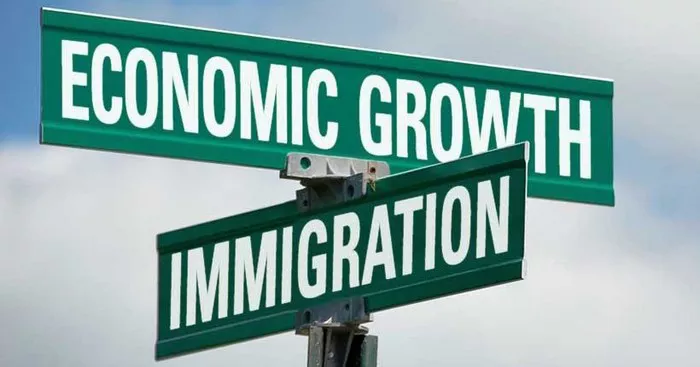Immigration has long been a contentious topic, often fraught with political and social debate. However, beyond the headlines and rhetoric lies a fundamental truth: immigrants are key drivers of economic growth in countries around the world. From filling critical labor shortages to fostering innovation and entrepreneurship, immigrants play a vital role in shaping and bolstering economies. In this article, we delve into the myriad ways immigrants contribute to economic prosperity, examining both empirical evidence and theoretical frameworks to underscore their essential impact.
Economic Contribution of Immigrant Labor
One of the most tangible ways immigrants contribute to the economy is through their labor force participation. Immigrants often fill essential roles in industries where there are labor shortages, ranging from agriculture and construction to healthcare and technology. By taking on jobs that native-born workers may not be willing or available to do, immigrants help sustain the smooth functioning of various sectors, thereby driving overall economic productivity.
Moreover, immigrants often bring diverse skill sets and experiences to the workforce, enriching the talent pool and enhancing productivity. This diversity of skills can lead to greater innovation and problem-solving within organizations, as different perspectives foster creativity and new approaches to challenges. Research has consistently shown that diverse teams outperform homogeneous ones, leading to better business outcomes and economic growth.
Furthermore, immigrants are more likely to be entrepreneurial than native-born individuals, creating new businesses and generating employment opportunities. According to the Small Business Administration, immigrants are almost 30% more likely to start a business than non-immigrants in the United States. These immigrant-founded businesses not only create jobs but also contribute to local economies through taxes, consumption, and community investment.
Innovation and Entrepreneurship
Beyond their contributions to the labor force, immigrants are also catalysts for innovation and entrepreneurship. Many of the most successful and innovative companies worldwide have been founded or co-founded by immigrants. From Google and Tesla to Intel and Pfizer, immigrants have played pivotal roles in driving technological advancements and disrupting industries.
One reason for immigrants’ propensity for entrepreneurship is their strong work ethic and drive to succeed. Many immigrants come to new countries seeking better opportunities for themselves and their families, instilling in them a determination to overcome challenges and pursue entrepreneurial ventures. This ambition and resilience often translate into entrepreneurial success, as immigrants are willing to take risks and pursue innovative ideas.
Additionally, immigrants often have networks and connections spanning across borders, facilitating international trade and investment. These transnational connections can open doors to new markets, partnerships, and opportunities for economic growth. Immigrant entrepreneurs leverage their global networks to access resources, expertise, and markets, enabling them to scale their businesses and compete on a global scale.
Contributions to Tax Revenue and Social Welfare
Contrary to common misconceptions, immigrants contribute positively to tax revenue and social welfare systems in the countries they migrate to. While some argue that immigrants strain public resources, empirical evidence suggests otherwise. Numerous studies have shown that immigrants pay taxes, including income, sales, and property taxes, and often contribute more in taxes than they receive in benefits.
Furthermore, immigrants tend to be younger on average than native-born populations, which means they contribute to the workforce and tax base for a longer period, helping to support social welfare programs such as healthcare and pensions. In countries facing aging populations and declining birth rates, immigration can serve as a demographic lifeline, mitigating the economic challenges associated with an aging workforce and supporting the sustainability of social welfare systems.
Moreover, immigrants often fill crucial roles in industries such as healthcare and eldercare, where there are shortages of skilled workers. By providing essential services and care to aging populations, immigrants play a vital role in maintaining the well-being and quality of life for elderly citizens, thereby reducing the burden on social welfare systems and healthcare infrastructure.
Cultural and Social Contributions
In addition to their economic contributions, immigrants enrich societies culturally and socially, fostering diversity, tolerance, and cultural exchange. Immigrant communities bring vibrant traditions, languages, cuisines, and customs, contributing to the rich tapestry of multiculturalism in host countries. This cultural diversity not only enhances the quality of life for residents but also attracts tourists, businesses, and talent from around the world.
Furthermore, immigrants often serve as bridges between cultures, facilitating cross-cultural understanding and cooperation. By bridging divides and fostering dialogue, immigrants contribute to social cohesion and harmony, strengthening the fabric of multicultural societies. Studies have shown that diverse communities are more resilient, creative, and cohesive, fostering innovation and social progress.
Moreover, immigrants bring a diversity of perspectives and experiences to public discourse and policymaking, enriching democratic processes and governance. By participating in civic life and contributing to public debate, immigrants help shape policies and initiatives that reflect the interests and values of diverse communities. In doing so, they promote inclusive and equitable societies that benefit all residents.
Conclusion
In conclusion, immigrants are indispensable drivers of economic growth and prosperity, contributing in myriad ways to the economies and societies of host countries. From filling critical labor shortages and fostering innovation to contributing to tax revenue and cultural enrichment, immigrants play a multifaceted role in shaping and sustaining vibrant economies. Recognizing and harnessing the potential of immigrants is not only morally imperative but also economically advantageous. By embracing immigration policies that facilitate integration, entrepreneurship, and diversity, countries can unlock the full potential of immigrant contributions and chart a path towards shared prosperity and inclusive growth.


